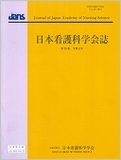Japanese
English
- 販売していません
- Abstract 文献概要
- 参考文献 Reference
要旨
目的:本研究は,教育学習環境におけるシビリティとインシビリティについて,看護学生の認識を明らかにすることを目的とした.
方法:2016年2月から2017年7月までに,学部4年生5人からなる3つのフォーカス・グループが得られ,各約1時間分の逐語録を分析資料とした.
結果:内容分析の結果,シビリティは4つのカテゴリーから構成され,(1)学べる環境の具備,(2)意思や価値観の尊重,(3)成長過程の共有,(4)関係性の拡充であった.またインシビリティは3つのカテゴリーからなり,(1)否定的な言動,(2)一貫性がない言動,(3)コンピテンシーの不足であった.
結論:本研究より,学生は自らの成長を伴う教育学習環境の構造と過程から教員のシビリティを認識し,学生と教員の相互の関わりの中止あるいは中断の原因となる状況からインシビリティを認識することが示唆された.
Purpose: The purpose of this study was to clarify perceptions of civility and incivility in the teaching-learning environment by conducting focus group interviews with undergraduate nursing students.
Methods: The study subjects were fourth-year students of 3 nursing colleges. From February 2016 until July 2017, 3 focus groups with 5 participants each were formed. Transcriptions from about 1 hour of semi-structured interviewing were analyzed through a thematic analysis using NVivo. In the interview guide developed by the researchers, civility was operationally defined as “scenes and circumstances where students are considered first as learners.” Incivility was defined as “scenes and circumstances where learning motivation has been reduced; for example, students have not been treated carefully or given poor respect.”
Results: The results of the qualitative analysis showed that civility consisted of the following 4 categories described by 11 sub-categories extracted from 28 codes: (1) preparation of the learning environment; (2) respect for intention and values; (3) sharing growth steps; and (4) expansion of relationships. Incivility consisted of 3 categories described by 11 sub-categories extracted from 36 codes: (1) negative behaviors; (2) behaviors with inconsistency; and (3) lack of competency.
Conclusion: Our findings suggested that the students perceived civility from the structure and process of the teaching-learning environment that prompted their own growth. They perceived incivility from situations that might cause discontinuation or interruption of the mutual relationship between learners and educators.
Copyright © 2019, Japan Academy of Nursing Science. All rights reserved.


